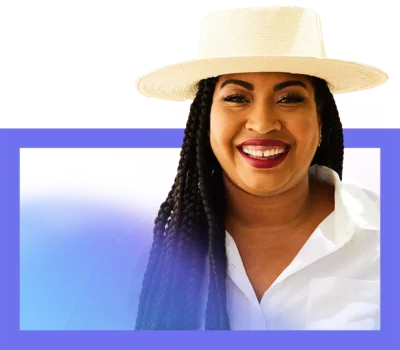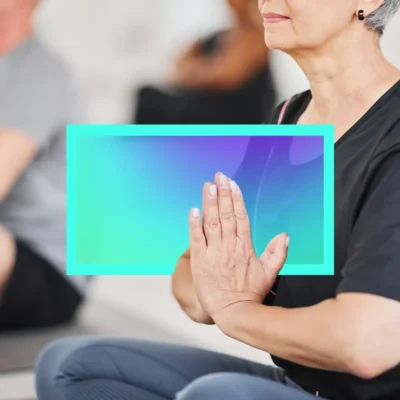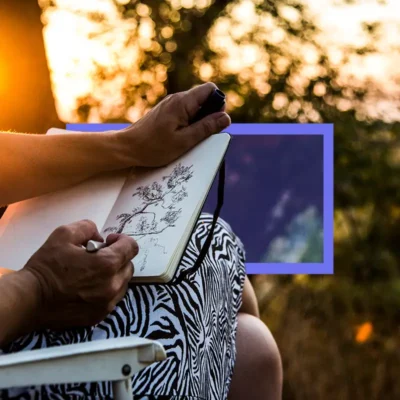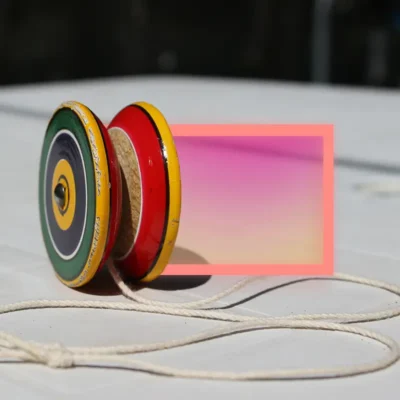My side hustle to a better life
Growing up, Rachel Cargle was used to seeing things her family couldn’t afford. As she got older, became a writer, lecturer, and philanthropist, she continued to seek opportunities just beyond her grasp. Hard work and creativity allowed her to grow successful as an entrepreneur, but deeper challenges still remained. In this episode of Meditative Story, Rachel unfolds how she found fulfillment by turning her gifts outward.

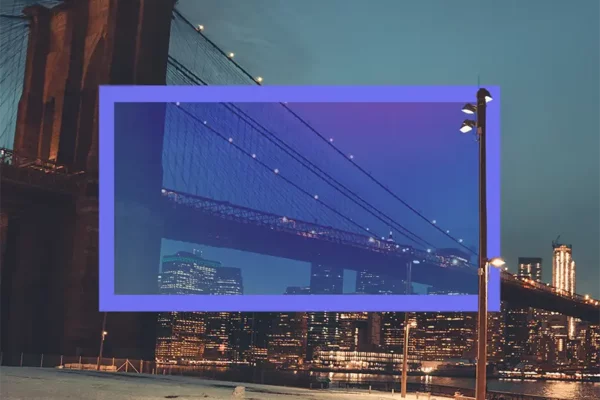
Table of Contents:
Transcript:
My side hustle to a better life
RACHEL CARGLE: I walk across a plush carpet in an elegant row house in Washington DC. I pause in front of the ceiling-to-floor bookshelf. It’s full of leatherbound literary classics and books on art and architecture. The kids I’m nannying have been asleep for hours. I already finished tidying up their toys. Tonight this space is all mine.
ROHAN GUNATILLAKE: Growing up, Rachel Cargle was used to seeing things her family couldn’t afford. As she got older, became a writer, lecturer, and philanthropist, she continued to seek opportunities just beyond her grasp. Hard work and creativity allowed her to grow successful as an entrepreneur, but deeper challenges still remained. In this episode of Meditative Story, Rachel unfolds how she found fulfillment by turning her gifts outward.
In this series, we combine immersive first-person stories, breathtaking music, and mindfulness prompts so that we may see our lives reflected back to us in other people’s stories. And that can lead to improvements in our own inner lives.
From WaitWhat, this is Meditative Story. I’m Rohan, and I’ll be your guide.
The body relaxed. The body breathing. Your senses open. Your mind open. Meeting the world.
CARGLE: The warm sun lights up the crowded backyard. Burgers sizzle on the grill. Girls jump into the swimming pool with shouts of glee. But from where I sit inside the house, behind the clear sliding glass door, the sounds are muted. I’m in fifth grade, and it’s our soccer team’s end-of-season party. I should be out there celebrating. Instead, I’m questioning my teammate’s mom over her kitchen table.
“How did you afford something like this?” I ask, gesturing toward the interior of the large home, full of gleaming kitchen appliances and real hardwood floors. It doesn’t occur to me that this question might be impolite. I just genuinely want to know. I want to know why my friends’ families have all this, and my family doesn’t. The man meets my directness with directness. He tells me about the degrees he earned in school, the type of career he sought out, and I file this information away, wondering how it might help me with my own goals.
My family lives in government housing within a wealthy suburb outside of Akron, Ohio. We’re one of the only Black families in the school district. We don’t have a pristine kitchen, a two-car garage, or a laundry room stocked with fancy detergent. We don’t go on vacations. We get pre-wrapped Christmas gifts from the Salvation Army. I don’t yet have the rationale for why some people have nice things and we don’t. I know my mom is just as smart as these moms. I know we work just as hard. But I don’t hold these differences against my friends. I don’t feel sorry for myself. What I feel is deserving. What I see is possibility. My mother always tells me how worthy I am, and I take that to heart. If it’s out there, it should be available to me, too.
I walk across a plush carpet in an elegant row house in Washington DC. I’m 23. I pause in front of the ceiling-to-floor bookshelf. It’s full of leatherbound literary classics and books on architecture and art. But the titles which catch my eye the most are books on succeeding as an entrepreneur. Memoirs of Black men and women who strive to get more than the world gave them.
The kids I’m nannying have been asleep for hours. I already finished tidying up their toys.
Tonight this space is all mine.
I settle into the elegant Italian leather couch with a book. This house resembles the houses I was so curious about, as a child. Back then, looking into my friends’ homes felt like discovering a world I didn’t know was possible. But no matter how many glimpses of that world I got, my life in Akron still felt limited. I wanted to see what I could do in a bigger city, with bigger opportunities. I wanted to open up new worlds, and have the freedom to explore them on my own.
In DC, my first concern is paying the rent.
I find a job in a taxi dispatch office, and I moonlight for a company that puts on kids’ birthday parties at a tumbling gym. I have no safety net. A $100 traffic ticket completely obliterates my budget for the month. The reality of my finances is limiting my options. I look for another side hustle.
I did some babysitting back in Ohio. So one morning on a break at work, I search for the name of an online nannying app I hear about. I spend hours poring over other people’s profiles to see what parents are looking for. I send exquisitely written messages to parents describing myself and telling them what type of nanny I am.
This is my opportunity to be a bit entrepreneurial. To create something that’s totally my own, to show myself off, and flex new skills. I won’t just be working behind a desk or helping further somebody else’s business. It will be all me.
GUNATILLAKE: Inviting your awareness to fill the body, how much all-me-ness can you bring to this moment? Recall a time in your life when you have felt the most all-me, the most yourself. Bring that feeling here, now, to this moment, however it makes sense for you.
CARGLE: In the row house, I keep a list of all the things I’m going to buy for myself when I get enough money. I write down the names of books on the shelves, CDs that I want to listen to. A record player. A fancy vacuum. The dried mango from the farmer’s market, and the imported sparkling water. Babysitting has become a manifesting machine for me. I don’t just dream about this kind of abundance anymore. I get to pretend I already have it.
Beyond the comfort in the home, I discover something unexpected: autonomy. Every chance I get to babysit is a chance for me to be creative with what I’m bringing, what I’m doing, and how I leave people feeling.
Before I pack up completely, I leave a sheet of paper on the kitchen counter that details everything the boys ate, the games we played, what time they went to bed. The next morning, I shoot them a follow up message to rate my online babysitting profile, and I make sure to note the parents’ address, so I can send them a Christmas card at the end of the year.
Going the extra mile impresses people. It helps set me apart.
But if I’m honest, the only person I’m trying to impress is myself. This is genuinely fun for me. It’s generative. It’s my art. It’s my opportunity to determine my own value.
The rich smell of cinnamon and cumin hits me as soon as I return home to my own apartment just outside of DC. I see my roommates in the kitchen, in the middle of cooking up a stew for dinner. Rose is from East Africa, and Doris is from West Africa. We live in a tall, crowded building with neighbors who speak Arabic, Chinese, and Russian, languages I never heard in Ohio. It’s all a bit of a culture shock, but it’s so joyful. Everyone here is so welcoming. So new. I’ve never felt further from the sheltered world of my childhood.
There are roaches in the building. I don’t live in luxury. But I feel like I’m discovering new things daily. I’m surrounded by opportunity and excitement. I feel alive.
Scrolling through the inbox of my nannying app profile, it’s blowing up with requests. All of my extra effort, all my hustling, is paying off. Almost too well. There’s no way I can take all of these jobs myself. If only I could have multiple versions of me to take advantage of these opportunities.
I decide to write a classified ad: “Looking for babysitters to help with a babysitting circle.” A few minutes later, I’m getting emails from other women in DC — women who, like me, are looking for a way to make their own money, to make their own choices.
I get copies of their résumés. I call their references. I use my own money to pay for background checks, custom t-shirts, and business cards. I start building a home grown nannying service. The entrepreneurial creativity is thrilling. I like seeing how good I can get at the simple things that no one really takes seriously. It’s empowering.
And more than that, it’s an opportunity to empower these other women too. It’s not just about me any more. We’re helping each other.
The girls I hire are always a little taken aback by my seriousness. “Sorry. Isn’t this just a babysitting job?”
Soon they’re right along with me, considering the possibility that babysitting could be more than just babysitting. I encourage them to look beyond what’s immediately available to them. “I don’t want anyone working here for more than a year. What’s your next thing? What’s after this?” I don’t know these women’s stories. I don’t know where they come from or where they’re trying to get to. I’m just trying to show them a way to autonomy, to what’s possible.
Exploring these new opportunities on my own feels amazing. But bringing these other women along with me feels new. It’s not something I saw or experienced back in Ohio. There’s a sense of interdependence with these women that I’ve never felt before. It feels valuable.
GUNATILLAKE: What does interdependence mean for you? What images or memories does it bring up? Interdependence is often a source of real strength, true community. If there are particular people from your life that come to mind, then let them come.
CARGLE: I’m 24 years old when I become a full-time live-in nanny. While Layla, the girl I care for, goes to preschool during the day, I keep working. In the mornings, I manage my side hustle — my nannying empire, and gaze out of floor to ceiling windows. I pet the family’s adorable dog; I munch on healthy snacks in another gleaming kitchen. For brief stretches, I’m not looking outside of my circumstances. I’m living the expansive life I think I always wanted. I feel peace and ease in my body.
The family I work for is Black, like me.
One summer, they bring me with them on vacation to Martha’s Vineyard. It’s an island off Cape Cod where former Presidents go sailing. There’s a town on the northern tip of the island where successful Black families have been vacationing for generations. It’s all new to me. We get off the ferry and meet up with other families. The kids run around the dock. It smells like fish and cotton candy and like possibility.
Everyone wears their alma mater sweatshirts. Howard University. Morehouse. They look so secure and comfortable. I didn’t know Black people existed like this in the world. It’s suddenly clear to me there’s so much more than just material wealth here. There is security and confidence. And it’s generational. And I watch how it brings a level of autonomy and freedom I didn’t know was possible for someone like me.
And yet, there’s a part of me that understands I am different. I’m not here on vacation. I’m here as a nanny. But I’m grateful for the opportunity to see into this world. To see something beyond my life in Ohio, beyond what I’ve found in DC. It’s another opportunity, if I can figure out how to expand my circumstances even further. If it’s out there, shouldn’t it be available to me too?
It’s Christmas time. My feet feel heavy in my winter boots as I trudge down the busy Brooklyn sidewalk, hands stuffed inside my jacket pockets. Looking down, I see the holiday lights on the storefronts reflected in half-melted snow in the gutter. I’ve been living in New York for a few years, and the family I’m nannying for now has sent me on an errand while they get ready to depart for their second home. The mom gives me $500 in cash to buy chocolates for her kids’ teachers for the holiday. Maybe it’s weariness. Or something else. But I’m no longer charmed or intrigued by this display of abundance. I’m just tired, uncomfortable, and annoyed.
Moving from DC, I leave my nannying empire beyond. It’s just me now, in Brooklyn. I’m trying to be strategic with who I nanny for, seeking out opportunities for advancement. But everything is still a struggle. I’ve hustled for so many years at this point, held down multiple jobs, gone above and beyond, and today, my boss put a week’s worth of salary in my pocket and sent me out in the snow to buy chocolate.
The personal autonomy I’ve gained somehow doesn’t feel complete. The gap between the life I have and the life I imagine is still so wide. It feels impossible. Inserting myself into the lives of others, I’ve lost sight of my own direction, what’s important to me. Nannying was a means to an end, but now I wonder what end?
I stop walking. I slump to the curb in a street in Dumbo. Shoppers swiftly move past me, barely noticing. It’s getting dark outside, and it’s freezing. The tears just start falling, and then freezing to my face. Has any of this hard work been worth it? I feel defeated.
The sky turns to greasy gray, and the streetlights come on. My cheeks sting from the cold tears. I think, “If I ever figure this thing out, if I ever actually can get to a place of success and comfort, I will tell anyone who asks me how I did it. I will never hold back and I will never make it look like it was simple. And I will always answer questions to anyone who asks me.”
Saying this to myself softens something inside. I realize what I want has changed. Where I see myself has changed. It’s no longer enough to briefly experience freedom and comfort while walking around other people’s homes. It wouldn’t even be enough if those comforts become permanent. Because it would still just be me. I want to empower other people to access a deeper ease, abundance, and opportunity. My nannying service allowed me to envision prosperity. Now I want to lift up those around me. Change the way we think about what’s possible.
I pick myself up off the sidewalk and wipe the frozen tears from my face. I buy the chocolates. I walk back to the home of the family who sent me out in the snow. They’re the last family I ever nanny for.
The big ferry starts to slow down on its approach to Oak Bluffs, Martha’s Vineyard. This summer, like last, I’m here with my partner and her daughter. Now she’s a Vineyard kid. We’ve brought a bunch of our friends from Jamaica who have never been here. I feel grateful to get to show them this place, to have it become a part of their worlds too.
Around the time I stopped nannying, I give a lecture on racism within the feminist movement to a small crowd in New York. I’ve been getting more involved in activism lately, reading books and academic papers from Black feminist writers. Now I want to share what I’ve learned with the audience who needs to hear it most: White women. My ideas resonate with people on social media, and the lecture eventually grows into a 13-city tour. It becomes a new entrepreneurial adventure. A new way for me to be creative in the everyday. I’m educating and empowering other people, while educating and empowering myself. I’m challenging people to change the way we think about our systems and about each other. It feels electrifying.
I lean over the deck railing and watch as the boat glides alongside the dock. It lines up perfectly, with barely a bump, just like I remember from the summer when I first visited as a nanny. Back when I saw into this world for the first time.
Looking beyond the circumstances of my childhood and my life in Ohio into the wider world has opened up possibilities I never could have imagined as a kid. Returning to Martha’s Vineyard with my own family, on my own terms, I think about how pushing myself to explore these new opportunities shows me what I’m really capable of achieving, beyond the comforts and luxuries I long for.
But when I feel like I’ve really won is when I’m able to open up those opportunities to other people. To other women. To my community. Finding success for myself is exciting, but reaching back and bringing others with me feels so much bigger.
When we reach beyond our circumstances and tell ourselves we are deserving of better things, we open up pathways that may have previously been closed off to us. Setting off on those pathways on our own feels empowering, but sharing what we’ve learned with those still limited by their circumstances is important. Because, if it’s out there, it needs to be available for all of us.
Rohan’s closing meditation
GUNATILLAKE: There’s a retreat center down in Devon, in the southwest of England that I used to go to quite often during my twenties. The main sitting hall is really wonderful; the whole place is a converted priory, so it has high ceilings, fantastic windows and is big enough to feel special and small enough to feel supportive.
Near the front of the hall where the teachers sit there is a Buddha statue in a conventional pose. But a meter or so in front of it, close to us as we sit there, is a different statue. She is Guanyin, and she’s awesome. In complete contrast to the other statue, Guanyin is sitting on a seat with one leg up, her right arm casually draped over her knee, and her other leg just hanging loose. The official name for this posture is royal-ease pose. I don’t know that yet as I admire her from my cushion in the third row back, I just think she looks like a total boss. The full version of Guanyin’s name means “The one who perceived the sounds of the world.” Guanyin is a bodhisattva.
The bodhisattva is a really important idea in Buddhism, and the various traditions all have slightly different takes on what it means. A bodhisattva is someone who has attained the highest wisdom but instead of just peacing out with what they have, they make it their life’s work to ease the suffering of others, not ceasing until all of us realize freedom.
I see this in Rachel and her story. The switch from wanting to realize success for herself and instead moving her center of gravity to helping others reach their goals. It’s the bodhisattva move.
So inspired by Rachel and Guanyin, let’s do a short bodhisattva meditation together.
Remember how Guanyin sits. If you like, you can look it up online. G-u-a-n-y-i-n, seated in a royal-ease pose. The Princeton University Art Museum website has a really good example of the kind of vibe I mean. It’s super relaxed. But there’s uprightness and control. So let’s invoke that in our bodies.
Letting the body be loose. The chest open.
Letting the arms and hands be soft. The heart open.
And however your body is, wherever you are, we’ll imagine ourselves at the center of things. Lines going out in all the ten directions: North. East. South. And West.
You don’t need to know where actual North is, just assume it’s ahead of you. Four lines going into all the cardinal directions. Imagining that the best you can, however you do.
Now adding four more lines. Northeast. Southeast. Southwest. Northwest. Now, eight lines emanating from where we are.
The final two. Above. And below. Stretching out above you to infinity. Stretching out below you to infinity. These are the 10 directions with little old us in the center.
And keeping our awareness wide, expansive, rolling out in all of these ten directions, we’ll drop in some phrases.
May all beings be free.
May all beings know happiness.
May all beings know peace.
May all beings walk their path to the end.
May all beings be free.
May all beings know happiness.
May all beings know peace.
May all beings walk their path to the end.
Keeping our pose of royal ease and our thoughts flowing out in all the 10 directions — imagining that, seeing that in whatever way works for you.
Solid in ourselves. Only able to give to others because we are solid in ourselves. Because we have enough. Generosity energizing us, not depleting us.
Using whatever phrases mean something to you. Maybe one of mine, maybe one of your own. Spreading bodhisattva vibes in all the 10 directions.
May all beings be free.
May all beings know happiness.
May all beings know peace.
May all beings walk their path to the end.
I vow to help this happen.
Because, if it’s out there, it needs to be available for all of us.
Thank you Rachel, and thank you.
Be well.
We’d love to hear your personal reflections from Rachel’s episode. How did you relate to her story? You can find us on all your social media platforms through our handle @meditativestory. Or you can email us at: [email protected].

